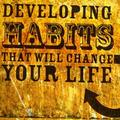The Habits That Crush Us
‘Don't panic. ' ~Douglas Adams Post written by Leo Babauta.
Why is it that we cannot break the bad habits that stand in our way, crushing our desires to live a healthy life, be fit, simplify, be happier?
How is it that our best intentions are nearly always beaten?We want to be focused and productive, exercise and eat healthy foods, stop smoking and learn to get rid of debt and clutter, but we just can't. The answer lies in something extremely simple, but something most people aren't aware of: We don't know how to cope with stress and boredom in a healthy way . The bad habits we've formed are often useful to us, in dealing with stress and boredom.Consider the bad habits that fit this bill: Smoking
Internet procrastination
Eating junk food
Drinking
Being rude/angry/depressed
Watching TV or playing video games (if you become addicted & sedentary) Shopping (getting into debt, building clutter)
Procrastinating on finances, paperwork, clutter (too stressful)
Inactivity (avoiding exercise is a stress avoidance technique)
Biting nails, chewing hair, clenching jaw
This isn't a complete list, but all of these habits fill a strong need: they are ways to cope with stress and/or boredom. We have formed them as coping mechanisms, and they stick around because we don't have better ways of coping. So what if instead, we replaced them with healthier ways of coping?
We'd get rid of the problems of these bad habits, and start getting the benefits of better habits. Better Coping Habits
How can we deal with stress and boredom instead?
There's no one answer, but the habits we form should be ones that lead to healthier results. Some ideas:
Walk/run/swim/bike
Do pushups, pullups, squats
Yoga/meditation
Play with friends/kids Create, write, play music, read when we're bored Learn to enjoy being alone, instead of being bored
Take a daily walk and enjoy nature
Deal with finances, clutter, paperwork immediately, in small steps, so that it doesn't get stressful Take control of a situation: make a list, get started in baby steps, so things don't get stressful Learn to be mindful of your breathing, body tension, stressed-out thoughts
Get some rest
Learn to savor healthy food that you find delicious
Slow down
Take a hot bath
Learn to live in the present
These are some good examples.Each habit above will help cope with or prevent stress or boredom. If you replace the bad habits with these, your life will be less stressful and healthier. You'll have less debt, less clutter, less fat, less disease. Changing the Habits
The old habits of coping didn't build up overnight, and they won't go away overnight either.We built them up through years of repetition, and the only way to change them is also years of repetition. But an important start is to realize why we do them — stress and boredom, largely — and realize that there are other ways to deal with these two problems.We need to be aware when stress and boredom start to kick in, and instead of being afraid of them, realize that they are problems easily solved by other habits. Let's take the fear out of stress and boredom. Let's learn that we can beat them simply, and prove that with repeated good habits. Once you have that realization, follow the usual Zen Habits steps to changing a habit:
Pick one habit at a time.
Start very small – just a minute or two, if you want it to stick.
Use social motivation like Facebook, Twitter, Google+ or email.
Be very conscious of your triggers, and do the habit consciously every time the trigger happens.
Enjoy the new habit. You'll stick with it longer if you do. We have been crushed by the habits we've formed out of fear of stress and boredom. We can fight back, by learning to breathe, to smile, to go slowly. We can humble these giants that crush us by turning them into mere gnats to be shooed away with a smile.
----
Want more?
Just open a collection. Enjoy these life-changing articles right now!
This is an article from zenhabits.net.
You can find it here zenhabits.net/crush/

